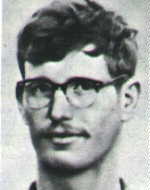Kosovitz, Giora (“Red Fox”)
Son of Zeev and Chaya. He was born on 22.6.1941 in Kibbutz Dalia and attended elementary and high school in the kibbutz, where he completed 12 classes. He was a member of the Hashomer Hatzair youth movement and when he grew up, he worked in the local branch of Hapoel and participated in the basketball team. For several years he studied space in the flute and excelled in playing. Giora was a stormy character in his childhood and adolescence. He was always lively and full of energy, loving gaiety and jubilation. He was naturally sarcastic and rough on the outside, but inside he was pleasant and pleasant and a clear-cut man, full of humor and cleverness. Giora was drafted into the IDF at the end of 1959 and was a good soldier and devoted to his duties, and he was honest with himself and with others, what he had to say to his comrades-in-arms and to work, he said directly, without any attempt to disguise and beautify things. “He did not do anything and said nothing out of humiliation, but he also had arguments with open eyes, and there was no tone of personal injury in his words, and they were said with his healthy humor, he believed in what he had done but did not try to preach morality to others. He loved his kibbutz and the army, and everyone had his family, and his wife found him a loyal friend willing to take the burden, to go through crises and march towards life When he returned from the army after his release, he entered the field of agriculture, and began to study, and his attitude toward the kibbutz was positive, because he grew up with him and his criticism did not apply to the healthy roots of the kibbutz. “The kibbutz will be built and maintained by those who want it and love it. Anyone who does not feel that way will go. “After his discharge from regular army service, he was called for periods of reserve duty in a combat engineering unit, first as a division sergeant, and since the Six Day War as a platoon commander. But Giora refused, because he did not want to receive a managerial position that required care and harassment in the areas of rationing, kitchen, routine, etc. He wanted to be in the field as much as possible in the operational unit. He was the head of the unit that placed mines on the Suez Canal and so did his last mission – Giora and his men joined the mission energetically, and during the ten days he headed, he managed to completely change the sight of the stronghold, and all the commanders and soldiers finished Hillel with his sense of responsibility and great concern for his soldiers. On the day of the 25th of Shevat 5702 (February 1, 1970), the Egyptians began a heavy bombardment of cannons and mortar shells on the stronghold that Giora and his men were working in. While the commanders and soldiers were safely in the depths of the fortified bunker, Giora jumped from the shelter of the bunker to the exposed area in order to direct the soldiers to safety. These soldiers were not from his unit but from a sister unit. Thus, out of concern for the safety of others, he was wounded by shrapnel from a bomb that exploded next to him and died. He left a wife and three small children. He was brought to eternal rest in the cemetery at Kibbutz Dalia. On the “thirty” day of his fall, a booklet was published in his memory, called “Giora the son of the Rocky, son of the thorns, son of Shemesh”; On the last memorial day, a sports hall called “Yad Labanim” was dedicated in Dalia, naming all the boys who fell in Israel’s wars since the War of Independence, and Giora among them.
